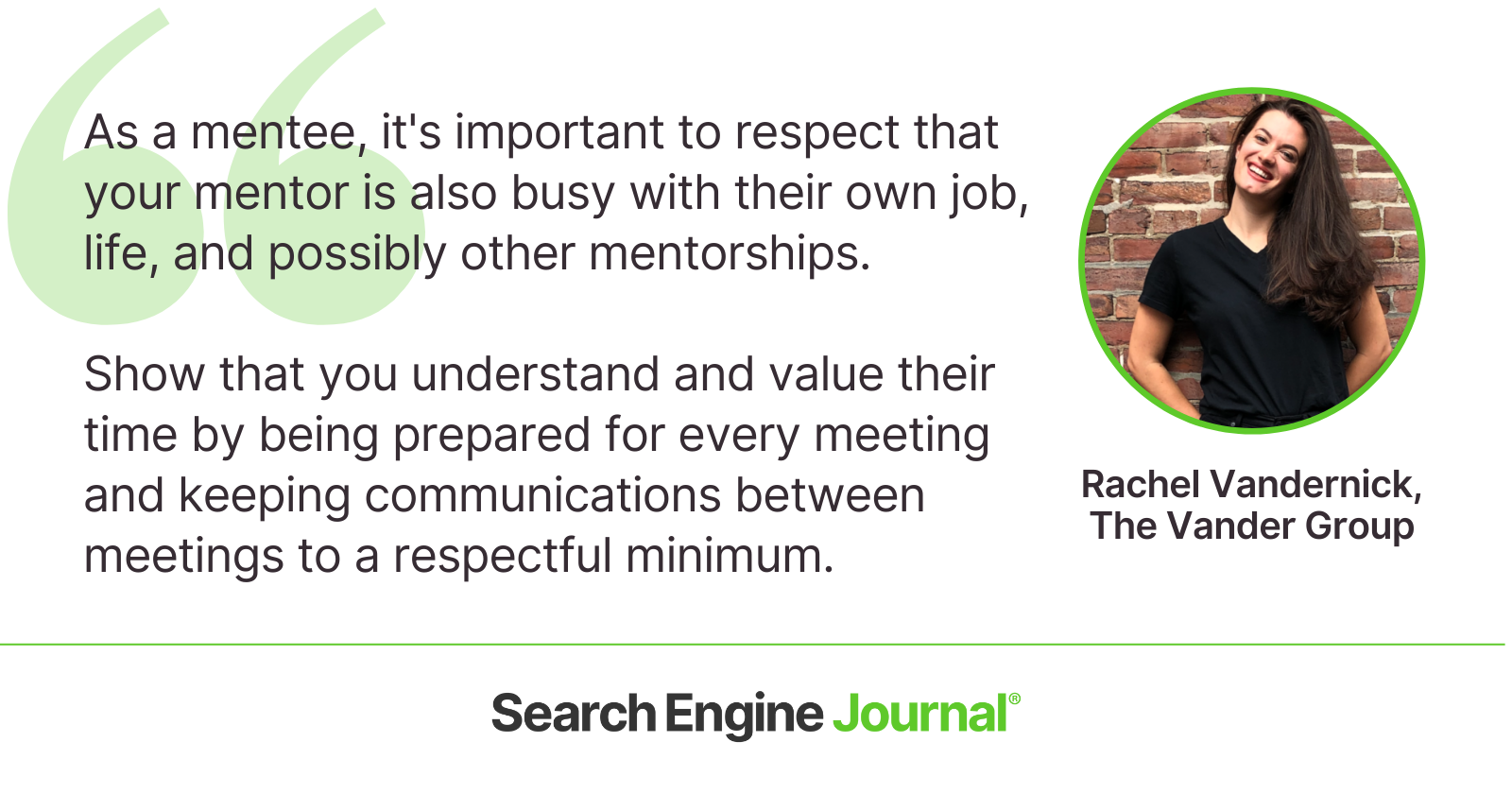It’s no secret that most SEO professionals learn their craft through hands-on experience rather than any formal training program.
While working with your own clients or taking a quick online crash course can help you understand the basics, there’s nothing like having one-on-one support from someone who’s been there before you to show you the ropes.
SEO mentorships are one of the best ways for new digital marketers to learn from experts in the field.
Whether you’re looking for your first job or interested in improving your skills in a particular sub-niche of SEO, mentorships can help you level up quickly and build your professional network.
For mentors, having the opportunity to share your knowledge can feel empowering and affirming and build confidence in leadership skills.
So how do you go about creating a mutually beneficial SEO mentorship?
Let’s walk through some of the best ways to set yourself up for success, and a few common mistakes to avoid.
Tips For Finding The Right SEO Mentor
As someone looking for an SEO mentorship, you should know exactly what you want to gain from the process before you can even think about reaching out to prospective mentors.
1. Go In With A Clear Set of Goals
Work on a clearly defined list of measurable goals and outcomes that you would like to see achieved by the end of your mentorship.
This will look very different for someone new to the industry versus an experienced marketer looking to branch out into a new field.
You may find that having goals related to certifications (like Google Analytics or other industry-recognized qualifications) or finding entry-level jobs are more of a focus if you’re still in the early days of your career.
On the other hand, having a handful of concrete goals around developing your technical SEO skills may be more valuable for a mid-career marketer making a career shift.
If you’re not sure what SMART (Specific, Measurable, Action-Oriented, Realistic and Time-bound) goals to make before you begin your search, make a note of the general outcomes you want from the mentorship.
Bring these to your first mentor meeting and make this a point to go over after your introductions.
With their experience, your mentor should be able to guide you as to the actionable goals to work toward.
2. Spend Time Researching Possible Matches

You may already have a person in mind when it comes to thinking about who you would like your mentor to be.
But don’t put all of your eggs in one basket. If they decline, you will likely need a few alternatives to consider approaching instead.
Don’t be drawn in by a famous name alone.
Think carefully about the type of person you want to learn from, which should be influenced by your goals, career aspirations, and even your personality and background.
Ask yourself the hard questions:
- How do I learn best?
- How much time am I willing and able to commit to this relationship?
- How will this individual help me get to where I want to be?
- Has this person had success with mentoring someone before?
- Is there something specific about this individual that resonates with me personally and could benefit my development?
Remember, just because someone has success in the SEO industry doesn’t mean they’re a good fit for your goals or personality.
Before asking about mentorship, it’s worth reaching out to the prospective mentor and getting to know them a little more.
Whether you take them for a coffee or meet over Zoom, an introduction and insight before asking about mentoring can help both parties see any professional chemistry.
3. Set Clear Expectations
Before agreeing to a mentorship, both the mentor and mentee should be honest and upfront about each person’s expectations.
For mentees, it’s likely your goals and career aspirations will drive most of this conversation.
Come prepared with information about how often you would ideally like to meet and in what format (online, in-person, etc.), but be flexible around your mentor’s schedule.
For mentors, having your own expectations in place is just as important.
As an experienced SEO professional, you likely have a lot on your plate, so it’s important to know upfront what kind of time commitment your mentee will expect from you.
You should also ask questions about anything specific that your mentee wants to learn from you.
This will help you prepare information or examples from your own career experience ahead of your next meeting.
Mentors should also be prepared to give feedback to their mentees around goals or projects they’re working on.
This is a good conversation to have at the beginning of your mentorship. Gather details about how your mentee likes to receive feedback and how you can best support them in their learning and development.
It can be helpful to keep the expectations of both parties written in a shared document that both can reference throughout the mentorship.
While this doesn’t need to be a formal contract, it can be helpful to have something to check back to if necessary.
4. Organize A Check-In Schedule
Once you’ve both agreed to work together in a mentor-mentee relationship, it’s time to solidify your plans.
Staying in frequent communication is the best way to build a strong connection, but it’s also easy to overstep boundaries (more on that in a moment).
Decide on the best time and method of communication that works for you both, including a regular time that you can meet for a more in-depth conversation.
Keep a schedule of check-ins, whether a call or Zoom, coffee meetup, or dinner.
This is the best way to ensure that everyone’s busy lives are accounted for while still fulfilling the expectations you agreed on.
Mentees should come prepared with an agenda sent to the mentor ahead of time with areas they’d like to discuss or review during your meeting.
Being prepared and organized is a clear signal that you appreciate and value your mentor’s time, along with helping you to stay on top of tracking your progress or addressing any issues that have come up since your last get-together.
Once your mentorship has come to an end, mentees should take the time to thank their mentor for their expertise, time, and guidance during the process.
A thank you card or heartfelt letter goes a long way.
For mentors, ask your mentee if they would like to continue an informal relationship with occasional check-ins or follow-ups if your schedule allows for it.
You’ve benefited from the mentorship, so be sure to let them know how much you appreciate their hard work and communication throughout the program.
Common Mistakes In Mentorships
While every SEO mentorship will look different depending on the people involved, there are a few common errors that individuals new to the process tend to make.
Constantly Sending Questions Or Requests To Your Mentor
Frequent communication is certainly a critical way to foster stronger professional relationships. Still, as a mentee, it’s important to respect that your mentor is also busy with their own job, life, and possibly other mentorships.
Show that you understand and value their time by being prepared for every meeting and keeping communications between meetings to a respectful minimum.
Ask yourself, “Can this wait until our next check-in?” before sending that text or email.

Viewing Mentorship As A One-way Street
Every SEO mentorship should be mutually beneficial and a back-and-forth dialogue.
That means no egos or long monologues about accomplishments, on either side of the relationship!
Mentees should feel supported and encouraged throughout the mentorship process.
Mentors should also be sure to work on their own communication and leadership skills by asking questions to their mentees on how they can help them more effectively with constructive feedback rather than criticism.
Telling Your Mentee All Of The Answers
When you’re an experienced SEO expert, it can be incredibly tempting to tell your mentee how to do everything.
You also need to remember that you’re not their boss, even if you’re taking a leadership role as a mentor.
Instead, work through any challenges that your mentee brings to you together, using your background to guide them but still allowing them to develop their own creative solutions.
As a mentor, you should also fully acknowledge when you don’t know something.
No one, including your mentee, expects you to know all of the answers to every question they might have.
Be honest when you’re unsure and see if there’s a way that you can find out before your next scheduled meeting.
In Conclusion
An SEO mentorship can be a rewarding and career-changing experience for both the mentor and mentee.
Sharing knowledge about SEO is one of the best ways to grow your professional skill set, introduce talented new marketers to the field, and help make the whole industry a better and more diverse landscape.
More resources:
- 6 Important Lessons Learned In Building An In-House SEO Team
- 202 Top SEO Experts You Should Be Following
- SEO for Beginners: An Introduction to SEO Basics
Featured Image: Jirsak/Shutterstock





![[SEO, PPC & Attribution] Unlocking The Power Of Offline Marketing In A Digital World](https://www.searchenginejournal.com/wp-content/uploads/2025/03/sidebar1x-534.png)